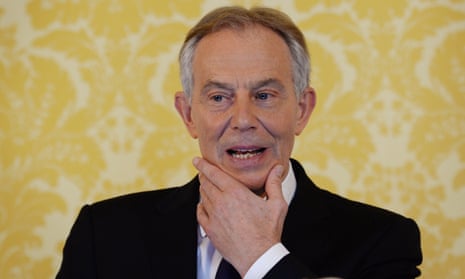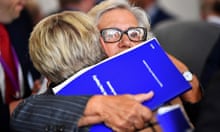Tony Blair should not face prosecution for his role in the 2003 Iraq war, the high court has ruled.
The lord chief justice, Lord Thomas of Cwmgiedd, and another senior judge, Mr Justice Ouseley, said on Monday that there was no crime of aggression in English law under which the former prime minister could be charged.
The decision blocks an attempt by a former Iraqi general, Abdulwaheed al-Rabbat, to bring a private war crimes prosecution against the former Labour leader.
The two judges recognised that a crime of aggression had recently been incorporated into international law, but said it did not apply retroactively.
The offence is not on UK statute books and it was for parliament to decide whether or not to do so, their judgment noted.
A recent supreme court case entitled Jones had ruled there was no crime of aggression in English law, Thomas said.
That judgment rejected an appeal by anti-war protesters that the damage they caused in 2003 was justified because they were preventing the greater crime of aggression in Iraq.
“There is no prospect of the supreme court departing from the decision in Jones,” Thomas added.
Earlier this month, lawyers for Rabbat argued that Westminster magistrates court was wrong to prevent the case from proceeding.
Michael Mansfield QC said the offence of waging an aggressive war had effectively been assimilated into English law.
The Chilcot inquiry’s conclusion that the invasion of Iraq was unnecessary and undermined the United Nations required the prosecution of Tony Blair, Mansfield told the high court.
The aim of the case was to force Blair – as well as the former foreign secretary Jack Straw and the former attorney general Lord Goldsmith – to answer for their actions in court.
Mansfield argued that the international crime of a war of aggression had been accepted by then UK attorney general Sir Hartley Shawcross QC in the 1940s, at the time of the Nuremberg trials of Nazi war crimes.
The attorney general, Jeremy Wright QC, who intervened in the case on behalf of the government, contended that the claim was “hopeless” and that the crime of aggression was unknown to the law of England and Wales.
In their judgment, Thomas and Ouseley conceded: “We see the force of Mr Mansfield’s contention that if there is a crime of aggression under international law, there should be a means of prosecuting it as otherwise the rule of law is undermined.”
Prosecution before an international court nonetheless presented “significant practical difficulties”, said the judges.
Within the UK, however, the clear principle is that “it is for parliament and parliament alone” to decide whether there should be a crime of aggression in domestic law.
Rabbat lives in Muscat, Oman, does not possess a passport and cannot travel to the UK. Responding to the judgment, Imran Khan, the solicitor who represented the general, said: “[He] is extremely disappointed with the judgment of the high court in London which brings to an end the hope of prosecuting Tony Blair, Jack Straw and Peter Goldsmith for the crime of aggression in invading Iraq in 2003.
“The invasion and subsequent occupation resulted in the deaths of hundreds of thousands of individuals as well as the displacement of over 4 million others including General al-Rabbat who has had to seek sanctuary and refuge in another country.
“Iraq has been left decimated and in a state of chronic instability. Despite all of this, and the clear findings of the Chilcot inquiry which laid bare the conduct of those that should be held to account, the high court has confirmed that there is to be no accountability. Those responsible are to remain unpunished. This is not justice.”
Khan said the government had been given “de facto domestic immunity” because “as long as it fails to enact legislation which makes the crime of aggression a domestic criminal offence, any leader can act as he/she chooses knowing that whatever action they take, it can be taken with complete impunity.”
Other countries, including Germany, Kosovo, and Serbia, have enacted domestic legislation, Khan said. “The failure of the British government to give tangible commitment to the prosecution of the crime of aggression undermines the rule of law. It sets a dangerous precedent in times of global insecurity and sets an example to the rest of the world of how to commit the most serious of crimes and get away with it.
“It is now the responsibility of the UK parliament to end this deplorable state of affairs and introduce legislation which ensures that the crime of aggression can be prosecuted in the criminal courts here.”








